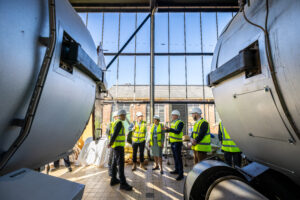An important milestone in the project to make Trafford Hospital the first retro-fitted Carbon Net Zero in-patient hospital in the UK was reached this week following the installation of temporary boilers on site.
Executives and projects leads from Manchester University NHS Foundation Trust (MFT) and Dalkia, the company appointed to carry out this work, celebrated the milestone alongside apprentices from the trust.

Kathy Cowell OBE DL, Chair of MFT, said: “This is an exciting project steeped in historical resonance as the birthplace of the NHS once again steps forward to lead the way for our health service.
“As the largest trust in the country we have a responsibility to our communities to heat our hospitals with green and sustainable methods, and this is an important next step in the project to make Trafford Hospital the first of its kind in the country.”
As well as posing for photos with the temporary boilers, which have been installed to continue to provide vital heat to the hospital while the new low-carbon air and water source heat pump system are installed, the team from MFT were given a presentation from Dalkia about the next steps of the project and what it will achieve for the hospital.

Jonathan Kershaw, Managing Director (Energy Services), for Dalkia UK said: “Dalkia is incredibly proud to be part of this groundbreaking project at Trafford Hospital. The progress to date we have made with the Trust marks a significant step forward in their journey towards Net Zero.
“This initiative not only demonstrates our commitment to sustainability but also sets a new standard for energy efficiency in healthcare. We look forward to continuing our work with Manchester University NHS Foundation Trust to achieve these ambitious goals and create a greener future for all”.
The project is being funded by a £18.9million grant from the Public Sector Decarbonisation Scheme and is projected to reduce the hospital’s carbon emissions linked to energy use by 92% by 2040, while also saving up to £100,000 a year based on current energy costs – which could increase further as energy prices rise in the future.
The project is estimated to be completed by Spring 2026.